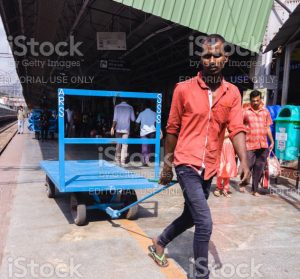The Porter
The Porter
Being failed to catch the last night super to Silchar, I decided to stay at a hotel at Last Gate, Dispur. And hence I was waiting for a city bus in Jalukbari. It was half past eight at night. Buses after buses were coming and going but not a single one to carry me to my destination. The buses that passed were all full of passengers and there was not even a standing seat for me. Already I got exhausted from the day’s journey. Being disappointed, I took a safe turn beside the road. As the night was getting on the city seemed to be busier. On the roadside, there was a big building used to commercial purposes in front of which a heavy truck was being unloaded. Some porters were busy with their respective work. Men in the crowd were coming and going through the footpath. Everybody seemed busy with everybody’s business. Suddenly my eyes fell on one of the porters who were unloading the truck. He looked like one of my university mates named Ashad. He was a brilliant student and stood first in the Post Graduate Examination. I met him last on the day our results came out. I became anxious and kept on looking at him. I gazed at him and became sure that he should be Ashad- as he bears the same physic, walks in the same gait and bears same the enthusiasm in his physical movements. I hesitated and asked myself, “Why would he be a porter? I had heard that he had become the principal of a college.” Already the task of unloading the truck had ended and he turned to go inside the building. Then I approached him and with some hesitation, I asked from behind, “O, please, are you Ashad?” He looked back at me and shrieked out, “O, Rajen! O! Why are you here?” I noticed, that he became so cheerful that he would almost embrace me but looking at his hand he said, “I am dirty.” It was so hot. Drops of sweat were flowing down his body. I said, ”I have to go to Silchar tonight but being failed to catch the last night super, I am here to stay at a hotel.”
He said, “You need not go to any hotel, come with me and spend the night with me in my chamber.”
I asked, “Why are you here as a porter? I have heard that you are the principal of H. J. K. College.”
He then put his left hand to his forehead and said, “It is my destiny that put me on this job. But friend, come to my room and then I shall tell you my story.” Saying so, he ushered me to a little far-off shed house thorough a by-line. He opened the lock of the room and entered it. I followed him and put my wallet on the little table that was laid on the door side.
He, pointing to a red plastic chair, said, “Sit on it and take a rest, I have to take bath.” Saying so, he took the towel in his hand and went out of the room.
I looked at my mobile and found that it was already 10 o’clock. The room was a little one but something clean. There was a bed, a chair, a stove, and some utensils. It was a shed house the walls of which were made of bamboo. Some pieces of clothes were kept hanging on the hooks struck in a post. After about fifteen minutes, he came back rubbing his hand and face with the wet towel. Then he, wearing a lungi and ganjee, said to me, “Rajen, sit down comfortably. I have to prepare our food.”
He then put out some tomato and potato from a plastic bag began to chop them into pieces and asked me, “Rajen, what are you doing now?”
I said, “I am jobless. Occasionally I write to some paper and magazine and earn my livelihood somehow.”
“Then you have become a writer! O’ how lucky I am that I have found a writer as my guest for the night.” Saying so, he burst into boisterous laughter.
Then he enquired about everything of mine and I replied with the fewest possible words and evades some questions skillfully to be answered as I was not interested to make him know my inner sorrow and sufferance which I thought to be my personal property.
At about 11 we finished our supper. Then he prepared some tobacco and put them into his mouth, he sat down beside me on the bed. As the night was getting deep it was getting hotter. He gave me a hand-made bamboo fan. I took it in my hand and said, “Tell your story about how you have been promoted to a porter from the post of a principal!”
Ashad then made a forced cough and began to recount:
After having passed M.A. in History, I decided that must do something to earn my livelihood as our family was as wretched as a Jewish family under the Pharaoh in Egypt. My father was a cultivator and he could hardly manage our family. You know that during my student life, I had to do a lot of temporary jobs to meet my schooling expense. Hence to get rid of extreme poverty, I was in dire need of a job. I tell you that I had appeared at least thirty interviews, but I could meet my luck nowhere. At last, after two years of taking my post Graduate, I was informed by one of my friends that a post was lying vacant in a local college. I ran up there and met the President of the Managing Committee. He said, “All our posts were fulfilled but recently Mr K. Kakati, who was in charge of the principal, has resigned from his post for a better chance. You know that in a venture institute, especially in Assam, the Managing Committee is the all in all. If you hope to get employed in the post of Principal, then you must donate one lac to the fund of the college. It is our final decision.”
Coming home back, I consulted the matter with my parents. My father said, “The two bighas of cultivable land had been sold for your education. Now if you need an amount of one lac to get a job, then I am unable. Do what you like.”
My uncle suggested that Ashad should be married with a dowry of said amount. Subsequently, I married Jenifa, the only daughter of good parents. They provided me with a good dowry and I paid the entire money to the president and got my employment as the principal of the College. The president, as well as all the members of the Managing Committee, said that they would do their best to provincialize the college within one or two years.
Months passed by. We began to meet more and more hardship. First few months Jenifa and I were doing well. She was beautiful, smart and amiable. She tried to understand our forlorn plight. But I was suffering from an inferiority complex as I was unable to provide her necessary facilities.
Already six months had passed. One day the President of the Managing Committee declared in a meeting that for the process of provincialization of the college we need an amount of five lacs. So every teacher must donate thirty-five thousand to the fund.
Already my father died of consumption without being gotten proper treatment. I began to see muster’s flowers in my eyes. All the responsibilities of managing the family fell on my head as I was the eldest son of my parents. My wife Jenifa was not accustomed to such hardship of life as she was the daughter of a school teacher. I could understand well how sorry she was with me. In the meantime, all our means were exhausted and we had to spend two days without food. Jenifa went to her parents’ home. After some days, I went to my father-in-law’s house to fetch Jenifa. But she declined my offer and said, “I will not go there to die of hunger.”
My mother-law, in fiery words, said, “I can’t see my only daughter die of hunger. Leave my home at once. We need not a son-in-law like yours who is unable to provide food to his wife.”
Feeling ashamed, I came back home. The next day I went to college with a gloomy heart. The President came to my chamber and declared, “All the teachers, except you, have paid their due.”
I said, “Please, excuse me. I am absolutely unable to pay the money.”
Then the President said, “No excuse will do. You must pay the said amount of money. We give you three days. Otherwise, you must go.”
I tried my best but I could not make up the sum. The President of the Managing Committee, on the fourth day, declared, “Sorry, we are unable to keep you in the post. We have promoted Mr V. Bharman to the post of Principal and as per our resolution that was taken yesterday’s meeting you are released. You may leave.”
I lost my job. Some days later I found a letter with an affidavit sent from the district court informing me that Jenifa has divorced me as I was unable to provide her with the necessary provisions as per Muslim Women’s Right Law.
Then I lost all hope in life. The world seemed to be very strange to me. I came out of home at night stealthily and got on a bus to Gauhati. The sky was cloudy. The west wind was blowing and then the rain began to fall heavily. At seven o’clock in the morning, I got down from the bus. I began to wander aimlessly. Not a pie was in my pocket. The heavy rain fell on my head and I got thoroughly wet. The shirt and pantaloons stuck to my skin. The sun turned its head to the west. I began to feel weak and tired. Already it was getting dark. The thousands and thousands of electric bulbs began to shed light along the roads. I came up to the building where we met yesternight. I was standing in front of the portico. After an hour a man about fifty years of age came out of the building and asked me, “I have noticed that you are standing there for more than an hour. What do you want?”
I seemed to come to sense suddenly and replied, “I have come to the city for a job.”
He asked, “What kind of job do you want to do?”
I said, “Anything, I get.”
He asked, “Do you want to drive a car?”
I said, “No.”
“Do you know the work of masonry?”
“No, Sir.”
“Then, what would you do?”
I thought, he had spoken the truth. I have learned nothing in life except reading and cultivating the land.
Then the man said to me, “You looked strong enough. Here a truck is coming. We have to unload it. If you like you can do it. We pay one rupee per bag.”
I said, “Yes, I shall do.”
Since then I have been doing the job of a porter and earn two to three hundred rupees per day with which I have been maintaining my house well.
I looked at the clock and found that it was half past twelve. I felt tired and wished to go to bed. But I asked, “If you get a chance would you like to take the job of a teacher?”
He said, “No, I shall never take the job of a teacher. I have experienced throughout the years that the venture schools of Assam are the playthings of the government which they keep always in the air and when they just began to fall on the ground they give again a wild kick and send them again up the sky; and in the hand of the departmental officials they are a resource of collecting black money without least goodwill and in the hand of the Managing committee the venture schools are alehouses to keep themselves drunk all the time.” 0 0 0
The Porter
N.B. The short story ‘The Porter’ originally belongs to the book ‘The Fugitive Father and Other Stories‘ by Menonim Menonimus.
The Porter
Books of Composition by M. Menonimus:
- Advertisement Writing
- Amplification Writing
- Note Making
- Paragraph Writing
- Notice Writing
- Passage Comprehension
- The Art of Poster Writing
- The Art of Letter Writing
- Report Writing
- Story Writing
- Substance Writing
- School Essays Part-I
- School Essays Part-II
- School English Grammar Part-I
- School English Grammar Part-II..
Books of S. Story by M. Menonimus:
Related Search:
- Indian English Short Story in English
- Short Stories with the Theme of Love
- The 12 Best Short Stories Ever Written
- Short Stories by Guy de Maupassant
- The Best Short Stories of the 21st Century
- The Greatest Short Stories of Anton Chekhov
- Short Stories by O’Henry
- The Greatest Short Stories of Leo Tolstoy ..











